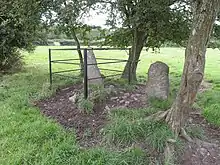Kiltera Ogham Stones
Kiltera Ogham Stones are two ogham stones forming a National Monument located in County Waterford, Ireland.[1][2][3]
| Kiltera Ogham Stones | |
|---|---|
| Native name Irish: Clochanna Oghaim Ceall Tíre | |
 | |
| Type | Ogham stones |
| Location | Dromore, Aglish, County Waterford, Ireland |
| Coordinates | 52.074351°N 7.847713°W |
| Elevation | 60 m (200 ft) |
| Height | 1.32 m (4 ft 4 in) |
| Built | AD 500–700 |
| Official name | Kiltera Ogham Stones |
| Reference no. | 330 |
 Location of Kiltera Ogham Stones in Ireland | |
Location
Kiltera Ogham Stones is located in a field on the east bank of the Munster Blackwater, 1.8 km (1.1 mi) west of Aglish.[4]
History
Kiltera Ogham Stones were carved in the 6th/7th centuries AD.[5]
Description
The larger stone (CIIC 266) dates from c. AD 500–700 and is slate, with quartz veins and measures 132 × 51 × 13 cm. The inscription reads ᚛ᚉᚑᚂᚂᚐᚁᚑᚈ ᚋᚒᚉᚖ ᚂᚒᚌᚐ ᚋᚐᚊᚔ ᚂᚑᚁᚐᚉᚉᚑᚅᚐ᚜ (COLLABOT MUCOI LUGA MAQI LOBACCONA), "Of Cóelub of the tribe of Lug, son of Lubchú."[6]
The smaller stone (CIIC 267) reads ᚛ᚋᚓᚇᚒᚄᚔ ᚋᚒᚉᚖ ᚂᚒᚌᚐ᚜ (MEDUSI MUCOI LUGA), "Medusi of the tribe of Lug." It measures 130 × 41 × 25 cm.[7][8]
A third stone (CIIC 268), carved c. AD 540–600, later removed to the National Museum, read ᚛ᚉᚐᚈᚈᚒᚃᚔᚏ᚜ (CATTUVIR).[9]
References
- "Holdings: On an Ogham stone, at Kiltera, Co. Waterford. With..."
- Macalister, R. A. S.; Martin, C. P. (1 January 1935). "The Excavation of Kiltera, Co. Waterford". Proceedings of the Royal Irish Academy, Section C. 43: 1–16. JSTOR 25515990.
- Killanin, Baron Michael Morris; Duignan, Michael V. (1 January 1989). The Shell guide to Ireland. Gill and Macmillan. ISBN 9780717115952 – via Google Books.
- "Kiltera Stones".
- Ferguson, Sir Samuel (1 January 1887). Ogham Inscriptions in Ireland, Wales, and Scotland. D. Douglas – via Internet Archive.
Kiltera Ogham Stone.
- Pip. "KILTERA OGHAM STONES/MEGALITHIC MONUMENTS OF IRELAND.COM".
- "megalithomania: Kiltera (Waterford) :: Ogham Stone :: Visit notes".
- "Ogham in 3D - Dromore / 267. Dromore II".
- "Ogham in 3D - National Museum / 268. Dromore III".